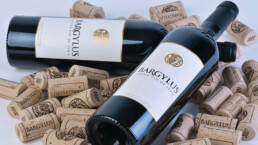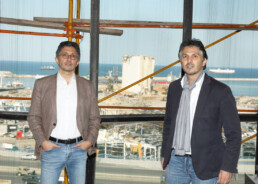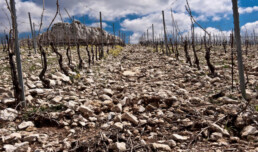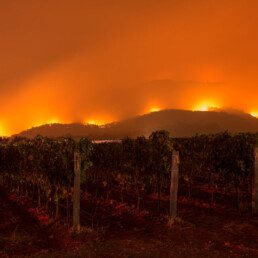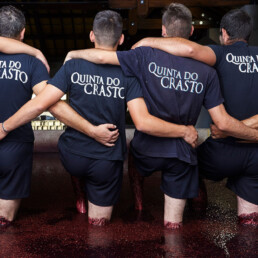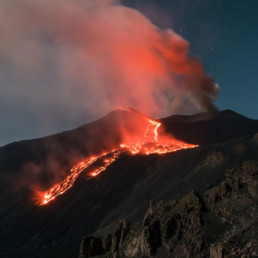Wines of War and Resilience: Château Marsyas & Domaine de Bargylus
We rarely think of glorious wine gems at the same time as war ravished countries. Yet, it is hard to discuss wine in Lebanon without eventually talking about war. Then also, the conflict in Syria, which borders the country to the north and east, looms large. For every field planted with vines or vegetables in the Lebanese wine area of Bekaa Valley, there is another dotted with refugee camps.
It is within these war-torn wine regions that our Dhall & Nash Wondermakers, the ever-resilient brothers Sandro and Karim Saadé (led by patriarch Johnny R.), are the winemaking forces behind the Bekaa Valley’s Château Marsyas, but they also own Syria’s only working winery, Domaine de Bargylus, which they have continued to run, remotely, straight through the conflicts.
The Geo-Political Situation:
Let’s look at a bit of background first. 2020 was a catastrophic year for Lebanon, even without the ongoing trauma and economic damage wrought by the Covid-19 pandemic. Then there was a massive warehouse explosion on the 4th of August that rocked Beirut’s port, killing more than 200 people, injuring thousands and leaving over 300,000 homeless.
At the time of the blast, the Saadé brothers, their father and several managers of the Château Marsyas winery team were in their commercial offices nine stories up and just 600 meters away from the explosions. They crawled through debris from fallen walls and ceilings to escape. Although Sandro and Johnny Saadé Snr. were hospitalised with injuries, they continued to conduct business from their hospital beds. Then, less than two weeks later, they were back harvesting grapes at their vineyards in Lebanon’s Bekaa Valley. “The grapes don’t wait” explained Sandro. “We had harvest and at the same time we were at the hospital. We transformed [our father’s] hospital room into an operational room for the harvest”. That is the kind of resilience winemakers have in this tiny country on the eastern Mediterranean coast.
The blast was the latest of a long line of catastrophes – starting with decades of mismanagement by corrupt, factionalised political parties in Lebanon which culminated in the collapse of the economy and currency and of Lebanon’s banking system, once the pride of the Middle East.
All this has had a dramatic impact on Lebanon’s wine industry – one of the few viable businesses remaining inside this shattered country. Lebanese wine producers are hardly strangers to tough times though, harvesting grapes and making wine throughout the 1975-90 civil war in the region. But the financial squeeze brought about by Lebanon’s economic collapse is of another order.
With inflation nearing 150%, and the value of the Lebanese pound spiralling downwards, the cost of all wine-related imports has risen exponentially. Local wine demand has also been impacted by the collapse in living standards, Covid-19 and the evaporation of Beirut’s once-famous night-life culture.
Despite all these political, economic, and logistical challenges, the harvests went ahead successfully in 2020 at both wine estates – the 148-acre Château Marsyas and the 30-acre Domaine de Bargylus in Syria. While the blast may have knocked the stuffing out of the Saadé offices and left them battered and bruised it doesn’t seem to have dented their resolve in the slightest.
“The only way to go is to persevere and build” recounted Karim to Drinks Biz. “It did not discourage us, we’re very determined and we will continue to make wine in these difficult times.”
The Saadé Family:
Originally from the coastal city of Latakia in Syria, for the past three centuries the Saadé family has been involved in agriculture as one of the largest landowning families in the country. All their family assets were then confiscated in the 1960s during Nasser’s presidency when both Syria and Egypt were united for slightly less than two years. The Saadé family work ethic is a continuing legacy of strength with great-great grandfather, Gabriel Saadé (1854-1939) being instrumental in reforming olive tree plantations in coastal Syria. Whilst Rodolphe Saadé (1900-1956) was a prominent industrialist. The Saadé family has always drawn from its strong Eastern Mediterranean (Levantine) roots and has a passion for challenges among which the renaissance of the ancient vineyards of their homeland. It was Johnny R. Saadé, Rodolphe’s son, himself a successful businessman, who always dreamed of returning to the family’s agricultural roots through the creation of vineyards in Lebanon and Syria. Thus, began Johnny Saadé’s wine passion projects, with his sons’ help, founding wineries in both countries in 2003 (Bargylus) and in 2005 (Marsyas).
The Château Marsyas Terroir:
Lebanon is among the oldest sites of wine production in the world. Within the premium wine region of the Bekaa Valley, there is a magnificent Roman Temple of Bacchus, proclaiming to all that the early Romans knew this to be a special terroir indeed.
The Bekaa is a long, narrow, fertile, high-altitude valley. Geologists describe the Bekaa Valley as an alluvial plain cradled between two mountains: Mount Lebanon and the Anti-Lebanon at an altitude of almost 1000 metres. The vineyards are protected on one side from the maritime rains and on the other from the hot desert climate.
Alluvial deposits have given the land a foundation of compact limestone, bedrock covered by 40-50cm of soil. The soil is red – evidence of iron – which together with white stones forms a clay-limestone growing medium well suited to vines. It is the limestone that gives the terroir its special character and adds something to each grape varietals’ classic aromas. Here in Bekaa, the normal plum and prune flavours of the Merlot tend towards truffle. The cassis scent in Cabernet Sauvignon leans towards notes of peony. The limestone also forces the roots of the vine to reach that much deeper into the ground, in search of the nutrients it needs. This translates in the mouth as a freshness that balances the natural power of the wines.
The Saadé Philosophy:
“The primacy of the soil and uncompromising quality” is how Karim and Sandro Saadé define their winemaking philosophy. This approach, unlike many local practices, is aimed at raising Lebanese wine to the level it deserves. Proud of their roots, the brothers are reluctant to consider Lebanese wine under any ethnic label as many others have tried to do.
Most importantly, they passionately believe that great wine is done primarily (90%) in the vineyard where they embrace organic viticulture and then (10%) in the cellar. By following this philosophy, Karim and Sandro Saadé have set very qualitative criteria such as high plantation density (6,250 plants per hectares) and a very low yield per plant (under one kg per plant) to achieve their goal. The grape varieties are generally Bordeaux and Rhône with some Cabernet Sauvignon, Chardonnay, Sauvignon and Sémillon as well. However, the wines taste nothing like their French counterparts. They have their own set of unique, spicy, herby flavours.
Karim Saadé says “Wine should be about openness, culture and curiosity.”
Domaine de Bargylus:
Centuries ago, wine was big business in Syria and more recently a few pioneers had tried unsuccessfully to resurrect it. The Saadé family have persevered and now own the only modern commercial winery in Syria even whilst a tragic civil war rages close by. It is no wonder that Domaine de Bargylus has been dubbed “the world’s most dangerous wine”.
“It was never going to be easy,” Karim Saadé recounted in the Wine Spectator.
Since war broke out in 2011, the Saadé family realised the wines of Domaine de Bargylus must also be the world’s most difficult to produce due to extreme logistical headaches. For example, they need to stock a two-vintage supply of corks and bottles in case there is an embargo. Further, the actual winemaking process is essentially made over the internet with an onsite winemaker, having to post images of grapes and vines for the brothers to assess. Samples of grapes and the finished wines then must make the perilous journey to Beirut, by taxi via Syria’s northern border. Finally, to get the wine to market, it takes a circuitous route from Syria to Egypt to Beirut then onto Belgium for distribution internationally.
Yet, despite the odds, Domaine de Bargylus has defied them all by reaching the tables of some of the best eateries around the world. And receiving wine critic Jancis Robinson’s high praise as “arguably the finest wine of the Eastern Mediterranean”.
Their goal was always to produce premium wines that stood their ground with top Bordeaux and Rhône wines. To help fulfil their vision they brought on board the famed consultant Bordeaux vintner Stéphane Derenoncourt. He still remembers the first time he saw the foothills of Mount Bargylus. “I found it majestic. And I thought, this is where we will make some serious wine,” Derenoncourt told Wine Spectator. “The wines have balance, maturity, freshness and aging potential, with a beautiful aromatic complexity that develops.”
Works on the winery started in 2003 with the first vintage being produced in 2006. This was a red blend of Syrah, Cabernet Sauvignon and Merlot aged for 14 months in French oak, then followed by a Chardonnay-Sauvignon Blanc blend in 2007. Today, the proportion of Syrah in the red has increased to 60 percent, as the grape thrives at Bargylus where the terroir is comparable to France’s Côtes du Rhône.
The Domaine de Bargylus vineyards comprise 12 hectares at 900 metres in altitude on a plateau in the province of Latakia, northwest Syria – above the country’s largest port. The brothers believed the cooler, sea facing slopes of the Jabal Ansarrieh mountain range (Bargylus was the ancient name) could deliver a different expression of terroir to that of their successful vineyard in Lebanon’s Bekaa Valley.
The Bargylus vineyard terroir is poor clayey limestone soil but ideal for growing their Syrah, Cabernet and Merlot. With it sitting at such a high altitude the desired diurnal temperature effect and maritime influence results in maintaining aromatic freshness and a slower tannin maturation.
Domaine de Bargylus has been a risky venture but ultimately, the Saadé family’s vision, hard work and ingenuity has laid the foundation for an industry that no doubt will flourish in more peaceful times. Syria and Lebanon certainly can produce wine to match some of the best in the world.
Encapsulating what Karim describes as a ‘spirit of perseverance’, Domaine de Bargylus and Château Marsyas produce wines of mesmerising quality. We are honoured at Dhall & Nash to represent these rich and dramatic wines. Now it’s time to taste a dangerous drop or two!
